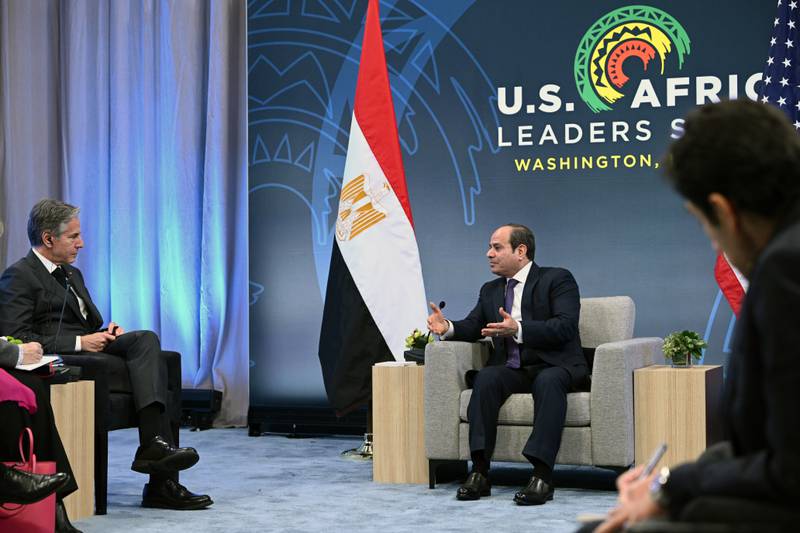Egypt’s President Abdel Fattah El Sisi has requested the US to help convince Ethiopia to sign an agreement governing the operation of a hydroelectric dam on the Nile.
The Grand Ethiopian Renaissance Dam is regarded as a menace to Cairo’s portion of the Nile’s water.
On Wednesday, El Sisi requested that Antony Blinken, the US secretary of state, agree to return to Egypt when they met on the sidelines of a US-Africa summit in Washington.
El Sisi emphasised how crucial and consequential this subject is to Egypt, thanking Blinken for his support and attention. Earlier in the week, Blinken met with Ethiopian Prime Minister Abiy Ahmed.
According to President El Sisi, reaching a legally binding agreement can achieve something good in accordance with international standards and norms. We are not asking for anything other than that, he said.
“We need your support on this matter.”
In northern Ethiopia, the Grand Ethiopian Renaissance Dam is located at Guba.
The Nile supplies virtually all of Egypt’s fresh water. The country warns that a reduction in its portion of the river’s water could wipe out hundreds of thousands of jobs in the agricultural sector and jeopardize food deliveries to its 104 million people.
Egypt and Sudan, downstream countries, insist that Ethiopia should sign a treaty governing the Gerd’s function and procedures for dealing with chronic drought.
The $4.2bn dam is nearly built. It is located on the Blue Nile, the main tributary of the river, which supplies over 85% of the water reaching Egypt.
The Gerd is said to be a cornerstone of Ethiopia’s development, and the country hopes to lift millions of its people out of poverty.
Rather than a legally binding agreement on dam operation guidelines, Addis Ababa prefers an agreement on guidelines on the operation of the dam.
Furthermore, the dam would not negatively impact Egypt or Sudan, and it might provide electricity for their neighbours.
Price said that Mr Blinken “ emphasised the importance of a diplomatic resolution” on the dam “that would safeguard the interests of all parties” in his meeting with Mr Ahmed.
Cairo is dependent on the Nile for most of its water, which flows through the city.
Abiy has repeatedly expressed his desire to see talks on the Gerd resumed with Egypt and Sudan. However, his administration has completed filling the dam three times since 2020, without informing the two downstream nations beforehand.
Last April, the three nations met to discuss the dam in the Democratic Republic of the Congo, where the African Union hosted the meeting. Ethiopia rejected proposals by Sudan and Egypt that the US, EU, and World Bank be involved as mediators.
In 2020, the former US administration under Donald Trump sought to mediate on the issue and cut off aid to Ethiopia after it refused to sign an agreement reached after months of negotiations in Washington.
The administration of President Joe Biden has taken a less publicized approach, avoiding any linkage between Ethiopian aid and the issues.
Ethiopian Prime Minister Abiy Ahmed attended the US-Africa summit in Washington.
In November 2020, the United States condemned Ethiopia’s offensive against rebels in the northern Tigray region, citing concerns about human rights violations.
President Sisi has mentioned the Gerd dispute with virtually every western leader he has met over the last two or three years, hoping to build a worldwide consensus in favour of Cairo’s position.
Sisi has also expressed his appreciation for Ethiopia’s development needs, offering Egyptian technical assistance to Addis Abba and stressing that diplomacy is the only way to resolve the conflict.
Image Credit: Mandel Ngan/Pool via AP



















